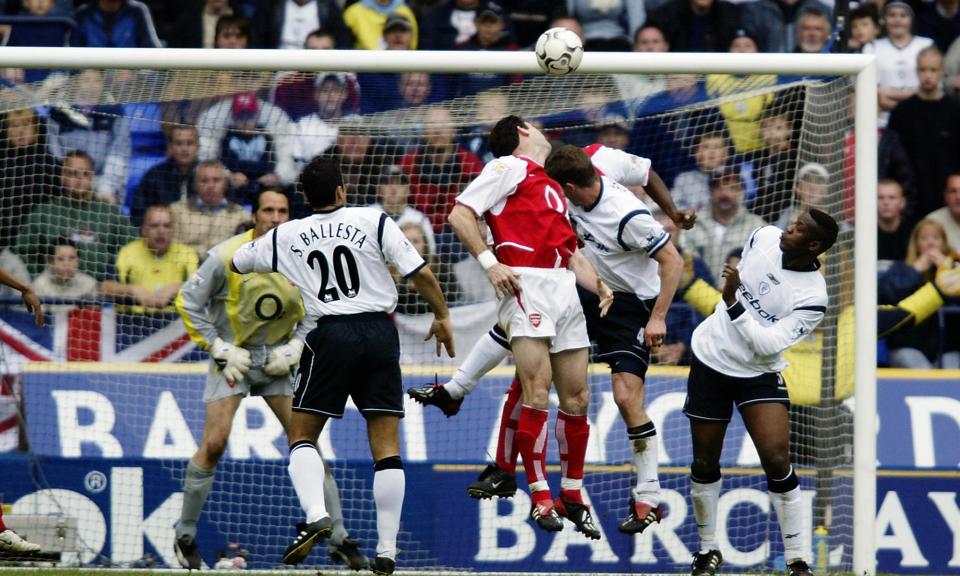‘Big Sam liked to spoil the party’: how Bolton made life a misery for Arsenal

“Big Sam liked to spoil the party,” Stelios Giannakopoulos says as his mind wanders back to Bolton taking on Arsène Wenger’s Arsenal in the Premier League. It was a clash of styles, the quick passing and attacking flair of Robert Pires, Dennis Bergkamp, Thierry Henry et al against the direct approach of Allardyce with Kevin Davies as its figurehead.
The clubs meet again at the Emirates Stadium on Wednesday night in the Carabao Cup but a long way from being equals. Since the days of Sam Allardyce Bolton have slipped from being Premier League mainstays to the brink of oblivion. They are back on firm ground in League One and, once again, are plotting an upset.
Related: AFC Wimbledon fan ‘flabbergasted’ as sinkhole fundraiser hits £50,000 target
Giannakopoulos was one of the Allardyce foreign legion that created an unlikely mix of cult heroes. From Jay-Jay Okocha and Youri Djorkaeff to Iván Campo and Nicolas Anelka, it was a gloriously multicultural world in Lancashire in the early 2000s and they had something in common: they wanted to upset the elite.
Arsenal won four of 12 games against Allardyce’s Bolton in the Premier League, a disappointing record considering their achievements in the Wenger era. “I enjoyed beating Arsenal more than anyone when I was in charge at Bolton,” Allardyce wrote in his autobiography. “We’d really got to them and Arsène Wenger hated us.”
At Bolton 28,000 packed into what was then called the Reebok Stadium in the expectation they could get something out of matches against teams such as Arsenal, Manchester United and Chelsea. “It was a place that was horrible to go to,” the former Arsenal defender Justin Hoyte says.
“No one wanted to go and play there – it was just horrible. Bolton had a different style of play that Arsenal weren’t used to, weren’t comfortable with and they just made it uncomfortable. It felt like we always played night games against them and it was cold and it was windy and rainy and it was just like one of those games where you thought: ‘Please just get this over with.’”
Even Arsenal’s Invincibles drew at the Reebok Stadium in the final match before Christmas. However high confidence might have been in north London, seeing Bolton next on the calendar brought a soupçon of nervous tension to the dressing room. And the better Arsenal were doing, the greater the achievement to take points off them.
“Allardyce liked to make a statement, especially in the big games, and our mentality was always the same,” Giannakopoulos says. “If you cannot cope with the rhythm, with the physicality, simply you cannot push on for the championship. We took advantage of these weaknesses, especially from Arsenal, and we managed to beat them quite a few times.”
Giannakopoulos scored in three home victories in league and cup over Arsenal as he became slayer in chief, ironically as one of Bolton’s less physically dominating players. “The only thing I remember is them crossing the ball and I missed a header on the back post that someone scored over the top of me,” Hoyte says, forgetting it was Giannakopoulos who nodded in.
Giannakopoulos says: “We had created a very, very good atmosphere, a fortress, so for everyone to come and visit was a very, very difficult afternoon, that’s for sure. That’s a credit to the fans [and] it was down to us as well because we managed to pull out performances that were very, very convincing and very, very enjoyable to watch as well because we managed to combine good performances with results.”
It was not only on the pitch where Arsenal felt provoked. Wenger would often be found in irate dialogue with the fourth official about how his players were being treated and in one match refused to shake Allardyce’s hand at full-time. In 2002-03, Arsenal were in the title race but were derailed by a 2-2 draw at Bolton and followed it with defeat at home to Leeds. “I can remember Wenger, who is always very physical in his complaints, on the touchline,” Giannakopoulos says.
“These are details that either motivate you or make you angry. In our case, it was motivation that came out of these complaints. Whoever the coach was, whether it was Mr Wenger or someone else, that means that we are good, that we are annoying and we can win games.”
Wednesday night’s match will be the teams’ first meeting in 12 years, bringing with it an avalanche of nostalgia for Bolton fans, recalling better times when the club finished seventh and eighth in successive Premier League seasons. Giannakopoulos enjoyed his time in Lancashire so much he still resides in the county and often visits the ground now known as the Toughsheet Community Stadium.
Players are no longer joining from Real Madrid and Paris Saint-Germain. Instead, Ian Evatt is raiding Newport and Bristol Rovers for his signings. After a slow start to the season, the 5-2 home victory against Reading on Saturday could be a turning point. Bolton have underwhelmed after losing the League One playoff final to Oxford United in May but taking on one of the big boys could offer extra impetus to carry on the journey back to the top.
Arsenal showed against Manchester City they may have learned a few of the dark arts that made Allardyce and his team so successful but Bolton will once again be hoping to shake things up. How can they cause a shock on Wednesday? “Maybe a team talk from Big Sam could do the trick,” suggests Giannakopoulos.

 Yahoo Sport
Yahoo Sport 




































































